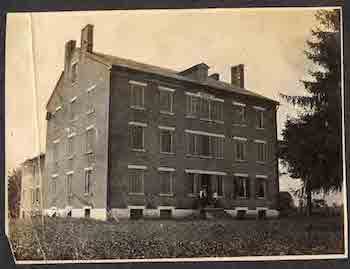WKU News
WKU to Host Annual State Archaeology Conference on Feb 28-March 1
- Friday, February 21st, 2020

On February 28-March 1, 2020, the Anthropology Program and the Kentucky Archaeological Survey in the Department of Folk Studies and Anthropology will co-host the 37th Annual Kentucky Heritage Council Archaeology Conference on the WKU Bowling Green campus. The conference brings professional archaeologists and students from across the Commonwealth and from bordering states to learn about recent research on a wide range of archaeology topics. The event is open to the public. The registration fee for the weekend conference is $25, payable at the door, and WKU students get free registration with a school ID.
The conference opens on Friday afternoon with a special tour of the South Union Shaker Village in Auburn. Besides learning about the history and lifeways of the Shakers, participants will learn about several archaeological research projects that have been conducted at the site. Participants arrange their own transportation to/from South Union. The walking tour begins promptly at 1:00 pm, runs for three hours, and costs $4/person.
Also on February 28, WKU will host an open house at the Anthropology Lab and Kentucky Archaeological Survey offices in Cherry Hall rooms 20-36. The open house runs from 4:30-6:30 pm on Friday and is free and open to the public. The open house features a screening of KAS’s newest documentary, Creelsboro and the Cumberland: A Living History.
On Saturday, February 29, conference registration begins at 8:00 am in Downing Student Union room 3029. Paper presentations begin at 9:00 am in DSU 3020 and run through 4:00 pm, with breaks for lunch. From 8:00-10:00 pm, there will be a poster session in the Hyatt Place Meeting Room, the conference hotel.
On Sunday, March 1, conference registration resumes at 8:00 am in DSU 3029. Paper presentations begin at 9:00 am in DSU 3020 and run through 12:00 pm noon.
This year’s slate of papers and posters focus on topics such as public archaeology, the Lewis Pottery Company, magnetic pottery, Clovis and Archaic stone tool technologies, Hopewell archaeology, photogrammetry applications, plant use, rock art, rockshelter archaeology, Lincoln family heritage, bedrock mortars, coal camps, historic cemeteries, village farming communities, Civil War provisions, and earthquake impacts on sites. A draft agenda may be found here.
All events are central standard time. A campus map may be found here. Directions to South Union Shaker Village may be found here.
This is the fourth time WKU has hosted the annual archaeology conference. The Kentucky Heritage Council (KHC), an agency of the Kentucky Tourism, Arts and Heritage Cabinet, serves as the State Historic Preservation Office (SHPO). It is responsible for the identification, protection and preservation of prehistoric resources and historic buildings, sites and cultural resources throughout the Commonwealth.
KHC programs include finding, surveying and documenting historic buildings and sites; making nominations to the National Register of Historic Places; administering federal and state historic rehabilitation tax credit programs; archaeological research and education; reviewing impacts of federal projects as mandated through Section 106 of the National Historic Preservation Act (NHPA); working with local governments and preservation commissions, conducting preservation education and planning, and administering the Certified Local Government (CLG) Program in partnership with the National Park Service; administering the Kentucky Main Street Program; and providing administrative support to the Kentucky African American Heritage Commission, Kentucky Native American Heritage Commission, Kentucky Military Heritage Commission and Perryville Battlefield Commission.
Since 1966, KHC has partnered with local, state and federal agencies, preservation organizations, local governments, universities, and interested citizens to fulfill its mission, which is integral to making communities more livable and has a far-ranging impact on issues as diverse as economic development, jobs creation, heritage tourism, affordable housing, community revitalization, environmental conservation, and quality of life.
Historic photograph of 1847 East House courtesy of South Union Shaker Village.
Some of the links on this page may require additional software to view.

